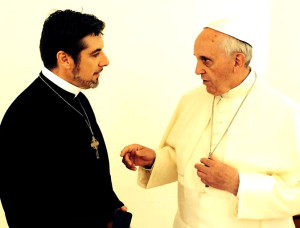 Tony Palmer, the former South African director of Kenneth Copeland Ministries who recently used a cellphone camera to record Pope Francis issuing an appeal for unity between Catholics and Christians, died Sunday after a motorcycle crash in the United Kingdom.
Tony Palmer, the former South African director of Kenneth Copeland Ministries who recently used a cellphone camera to record Pope Francis issuing an appeal for unity between Catholics and Christians, died Sunday after a motorcycle crash in the United Kingdom.
In January, Palmer held the smartphone that recorded Pope Francis calling on all Christians to set aside their differences with Catholics. Palmer, a bishop and international ecumenical officer with the independent Communion of Evangelical Episcopal Churches, also helped coordinate the pope’s meeting with Copeland and other televangelists in June.
In the video, Pope Francis referred to Palmer as “my brother, a bishop-brother,” saying they had been friends for years.
“Let us allow our longing to increase so that it propels us to find each other, embrace each other and to praise Jesus Christ as the only Lord of history,” Francis said.
Born in the U.K. and raised partly in South Africa, Palmer had served as the director of the South African office of Kenneth Copeland Ministries. On Copeland’s website, Palmer said he had met Archbishop Jorge Bergoglio of Buenos Aires (now Pope Francis) in 2008 when Palmer sought permission to work with charismatic Catholics in the city.
At the Copeland-hosted Charismatic Evangelical Leadership Conference, Palmer submitted the message from the pope, which called for unity between Christians and Catholics and asserted that the days of Protestant reformer Martin Luther were over. Copeland responded by sending a positive message of his own and praying for Pope Francis.
In a February blog post for Patheos, Anglican-turned-Catholic priest Dwight Longenecker focused on Palmer as representing something new in Anglicanism, especially for Palmer’s involvement in the Convergent Movement, a charismatic Anglican group that ordains women as deacons and priests.
“One has to ask, when Tony Palmer presented himself therefore as ‘an Anglican Bishop’ did Archbishop Bergoglio of Argentina have any idea that this was the background and was he aware of this rapidly shifting identity of Anglicanism? I suspect he did not,” Longenecker wrote. “How was a Catholic bishop in Argentina expected to be aware of the mushrooming complexity of Anglicanism?”
After the pope’s June meeting with televangelists, Longenecker wrote that the real division is not between Catholics and Protestants.
“The real divide is between progressives who wish to alter the historic faith according to the spirit of the age, and those who believe the spirit of the age should be challenged by the eternal and unchanging truth of the Christian gospel,” he said.
Retired Pope Benedict XVI invited Anglicans to join the Catholic Church, allowing priests to remain married and continue to have some autonomy. With a Catholic wife, an international background and a charismatic evangelical blend, Longenecker stated that Palmer served as the “face” for new Anglicanism.
But some have warned against ecumenicism and assert that it should have no place in the Christian Church. Mike Gendron of Proclaiming the Gospel Ministries in Dallas, Texas stated that those who urge evangelical ecumenicism with Catholics are “doing a disservice to the Roman Catholic Church because [they are] putting the gospel off limits to the the Body of Christ for evangelizing Roman Catholics.”
“And so, if they don’t hear the Gospel, they have no hope in ever being saved,” he said.
Christian News Network contributed to this report.
Become a Christian News Network Supporter...


